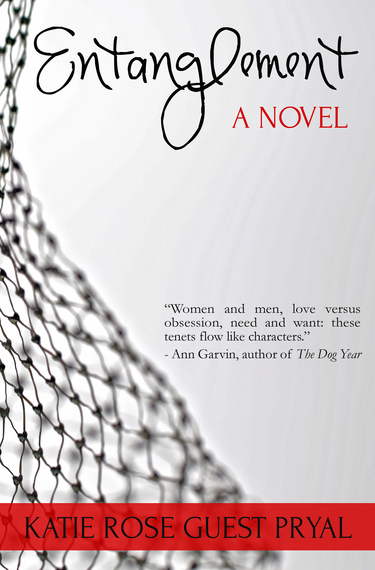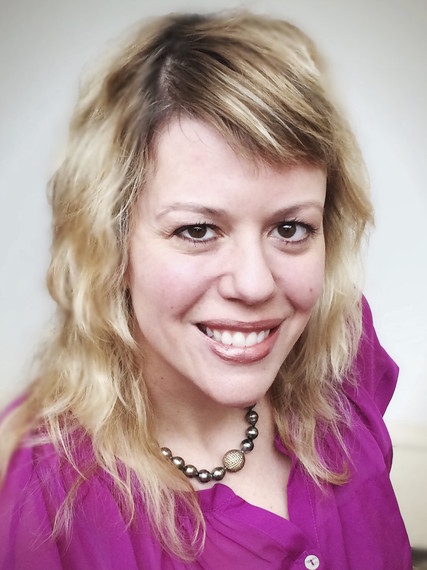Katie Rose Guest Pryal is the author of the Velvet Morning Press release, Entanglement. Katie spoke to me about the many roles she assumes in her life and how they all lead back to her "love of the written word."
You wear many hats in your life. You are a writer, lawyer, activist, writing coach (and former professor), and mother. Where do these roles overlap for you?
I wanted to devote more time to writing and to my family, so I left my job as a professor in December of 2014. My goal was to make a living as a full-time writer, and I've been able to do so, between working as a freelance journalist, a novelist, writing nonfiction books, and helping others with their writing challenges, I've put together a new career. Being a lawyer has been a big help because I'm self-employed now and that involves a lot of contracts and other business arrangements that legal training demystifies.
What is your ideal writing day?
I love having a wide-open day, but with my life, those days are rare. When I do have a day that I can set aside for writing--and even when I don't--I block out time on my planner for what I'm going to work on throughout the day, usually in 2-hour chunks. And I always schedule in walks--but meals I eat while I'm working. Like this: 8am-10am, Revise Chapters 1-3. 10am-10:30am, Take walk. 10:30am-12:30pm, Revise and file article with editor. 12:30pm-1pm, Take walk. 1p-3p, Revise chapters 4-6...you get the picture. Scheduling in these chunks of time helps me focus my energy on the projects I want to accomplish that day. And by the end of the day, when I've accomplished my goals, I feel really proud of myself.
What is your advice for other writers who wear multiple hats?
Try to find places where your life, and skills, intersect. Those are the places where you can double-dip and make the most of your energy. You can double-dip, say, a scholarly article you wrote for your academic job by reworking it into a journalism piece for a magazine. I call that an "article remix." Even if you aren't a former academic and a writer, there are always ways to double-dip. Use them. I also recommend drawing time boundaries. Use the time-chunking technique I described earlier, for example, or other ways to protect your time. And remember: the person you most need to protect your time from is usually yourself.
I love the word Entanglement. How did you select this to be title? Where do you see this theme surfacing in the novel?
"Entanglement" refers to a phenomenon in physics--and this is a simplification--where two particles affect each others' behavior at great distances and faster than the speed of light. Albert Einstein thought entanglement was "spooky." I chose the title for two reasons. First, Greta, one of the main characters, is a physics major, and physics is a large part of how she sees the world. Second, the word is a metaphor for our relationships can affect us, even over great distances, even in an instant.
Your book deals with the complex nature of friendship. What does being a true friend mean to you?
Being a true friend is both very easy and very hard. You have to accept the person with no judgment--radically accept who they are and their flaws. You have to be reliable, that is, selfless enough to support your friend even when it is inconvenient for you. And at the same time, you have to know when and where you can help your friend become a better person with honest criticism. Giving honest criticism requires bravery on your part, because it opens you up to risk--your friend might get mad at you. But if a friend knows that you accept them completely and are totally there for them, they are very likely to accept your honest criticism. The balance holds.
How might your characters Greta and Daphne define friendship? Do you think their definition evolves as the story unfolds?
I think, at the beginning of Entanglement, Greta and Daphne were true friends to each other. I think the problem was not the quality of their friendship, but rather its origin. They became friends because they had no family and no one else that they trusted. The world thrust them together and they clung to one another. Their friendship then grew into one of trust, honesty, and radical acceptance. But, through the course of the novel, as other friends--and lovers--begin to enter their lives, fear emerges. Will their friendship be able to withstand the presence of others? Or will it fall apart?
You can find Katie on Twitter at @krgpryal, on Facebook, on her blog, or with her tribe of Tall Poppy Writers.


